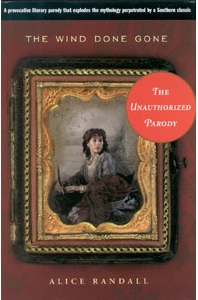The Wind Done Gone
 |
|
| Author | Alice Randall |
|---|---|
| Country | United States |
| Language | English |
| Publisher | Houghton Mifflin |
|
Publication date
|
1 May 2001 |
| Media type | Print (hardback & paperback) |
| Pages | 210 pp (first edition, hardback) |
| ISBN | (first edition, hardback) |
| OCLC | 45002181 |
| 813/.6 21 | |
| LC Class | PS3568.A486 W56 2001 |
The Wind Done Gone (2001) is the first novel written by Alice Randall. It is a bestselling historical novel that tells an alternative account of the story in the American novel Gone with the Wind (1936) by Margaret Mitchell. While the story of Gone with the Wind focuses on the life of a wealthy slave owner, Scarlett O'Hara, The Wind Done Gone tells the story of the life of one of her slaves, Cynara, during the same time period and events.
The title is an African American Vernacular English play on the original's title. Cynara's name comes from the Ernest Dowson poem Non sum qualís eram bonae sub regno Cynarae, a line from which ("I have forgot much, Cynara! gone with the wind") was the origin of Mitchell's novel's title.
Gone with the Wind revolves around O'Hara, a pampered Southern woman, who lives through the American Civil War and Reconstruction. The Wind Done Gone is the same story, but told from the viewpoint of Cynara, a mulatto slave on Scarlett's plantation and the daughter of Scarlett's father and Mammy.
Sold from the O'Haras, Cynara eventually makes her way back to Atlanta and becomes the mistress of a white businessman. She later leaves him for a black aspiring politician, eventually moving with him to Reconstruction Washington, D.C.
The book consciously avoids using the names of Mitchell's characters or locations. Cynara refers to her sister as "Other", rather than Scarlett, and to Other's husband as "R" (and later, "Debt Chauffeur") instead of Rhett Butler. Other is in love with "Dreamy Gentleman" (Ashley Wilkes), although he is married to "Mealy Mouth" (Melanie Wilkes). The magnificence of the O'Haras' house, Tara, is reduced to "Tata" or "Cotton Farm", and Twelve Oaks is renamed for its builders, "Twelve Slaves Strong as Trees".
...
Wikipedia
